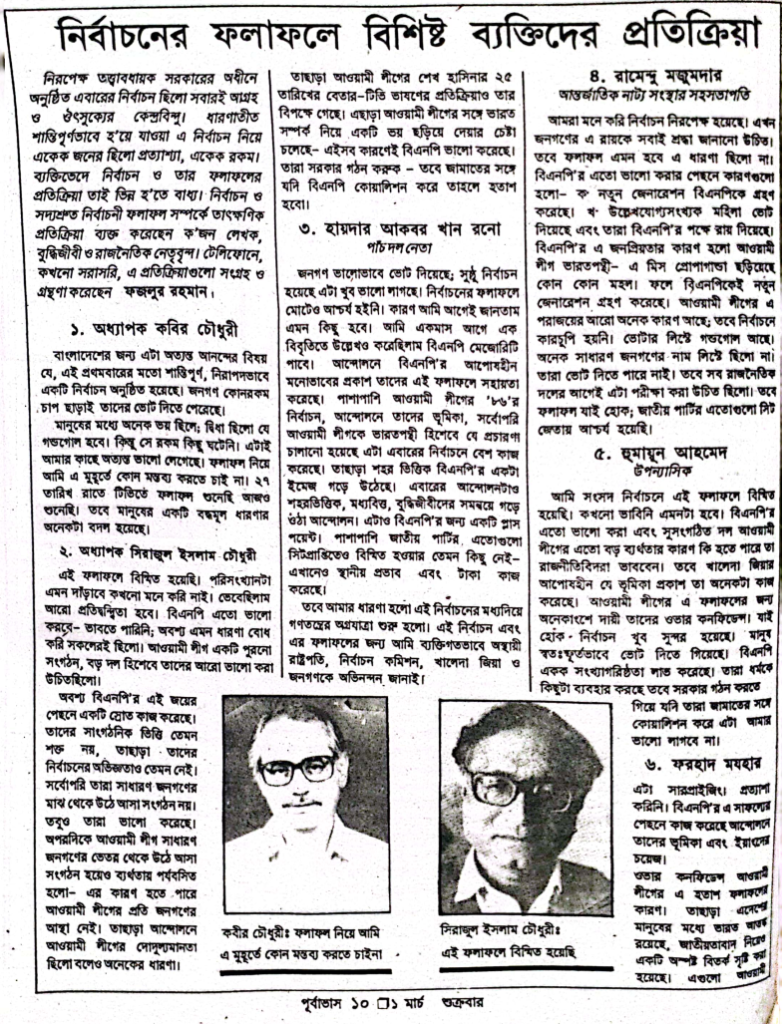Bangladesh’s first free and fair election under a caretaker government was held on February 27, 1991. The Bangladesh Nationalist Party (BNP), led by Khaleda Zia, secured a surprising victory by winning 140 seats. Most of Bangladesh’s intelligentsia believed that the Awami League, a ‘force supporting the liberation war,’ being a well-organized party, would easily come to power, a notion significantly challenged by this election.
A magazine named ‘Purbabhas,’ run by journalists sympathetic to the Awami League, published the views of contemporary intellectuals and civil society representatives at that time. Mozammel Babu edited the magazine. Humayun Ahmed, Kabir Chowdhury, Farhad Mazhar, Sirajul Islam Chowdhury, Haider Akbar Khan Rono, Ramendu Majumdar, and others expressed their opinions. Their statements were published verbatim.
Professor Kabir Chowdhury:
It is a matter of great joy for Bangladesh that a peaceful and secure election has been held for the first time. People have been able to cast their votes without any pressure.
People were afraid; there was doubt that there would be trouble. But nothing like that happened. I am very happy about that. I do not want to comment on the results at this moment. I also heard the results on TV on the 27th night and today. However, people’s deeply rooted beliefs have changed greatly.
Professor Sirajul Islam Chowdhury:
I am surprised by this result. I never thought that the statistics would stand like this. I thought there would be more competition. BNP will do so well—I could not imagine. Of course, I think everyone had such an idea. Awami League is an old organisation; they should have done better as a big party.
However, a current has worked behind the BNP’s victory. Their organisational base is not so strong, and they have limited experience in elections. After all, they are not an organisation emerging from the common people. Still, they did well. On the other hand, the Awami League, an organisation that emerged from among the common people, failed—this may be because the people did not have confidence in the Awami League. Many think the Awami League was hesitant in the movement.
Moreover, the public reaction to Sheikh Hasina’s radio-TV speech on the 25th also went against her. Besides, there is an attempt to spread fear about India’s closeness with the Awami League—for these reasons, BNP has done well. Let them form the government, but I will be disappointed if BNP forms a coalition with Jamaat.

Abdullah Abu Sayeed (Director of Bissho Shahitto Kendro)
There has been no election in the country for a long time. As a result, the people had a dilemma about the election. It is evident that we can use our power of discipline.
This is truly an exceptional result, but it is also a blessing for the Awami League. Today’s Awami League would have to start from where Sheikh Mujibur Rahman began in 1971. The country was experiencing an economic crisis, and it had to be addressed. As a result, the Awami League would have fallen into the same crisis as Sheikh Mujib.
However, the reasons they have for this disappointing result are:
1. Awami activities and terror during Sheikh Mujib’s regime.
2. Popularity of Ziaur Rahman.
3. Awami League’s dysfunctional structure as an organisation.
However, organisationally, both parties are weak. Yet, the BNP gained popularity through being active. They have a new energy and brilliance. The youth has embraced this power. Today’s youth have not seen Sheikh Mujib or heard of him. They have seen Zia’s tenure and the forward-looking approach of the BNP, which has also worked. The Awami League’s internal conflict has created many crises in this case. Apart from this, religion is a big thing in our country. BNP is exploiting it. They have an alliance with the Jamaat on this issue and can form a coalition with them.
People were very scared. People understand the pain of losing democracy.
However, the time has come for Awami League to introspect.
Haider Akbar Khan Rono (Leader of Five Parties)
People voted for the party of their choice; it feels good to have a fair election. I was not at all surprised by the election results because I already knew something like that would happen. I also mentioned in a statement a month ago that BNP would get the majority. BNP’s uncompromising attitude in the movement helped them achieve this result. Besides the participation of the Awami League in the 1986 election, their role in the movement, and above all, the campaign tagging Awami League as a pro-India party, worked well in this election.
Moreover, a city-based image of BNP has been developed. The recent movement was also urban-oriented, middle-class, and intelligentsia-based, which is also a plus point for BNP. Also, there is little wonder that the National Party won so many seats—local influence and money were at work here, too.
But I think the march of democracy started with this election. I personally congratulate the Interim President, the Election Commission, Khaleda Zia, and the people on this election and its result.
Humayun Ahmed (Novelist)
I am surprised by this result in the parliamentary elections. I never thought it would happen. Politicians will wonder what could be the reason for the BNP doing so well and the Awami League failing so well. But Khaleda Zia’s uncompromising image has worked a lot. Awami League’s overconfidence is largely responsible for this result. Anyway, the election has been great. People spontaneously went to vote. BNP won the single majority. They have used religion to some extent. But I would not like it if they formed a coalition with Jamaat while forming the government.
Farhad Mazhar
It is surprising. They did not expect it. Their role in the movement and the choice of young people have worked behind BNP’s success.
Overconfidence is the reason for the Awami League’s disappointing result. Moreover, the people of this country fear India, and a vague debate has been created about nationalism. They worked against the Awami League.
BNP, Jamaat, and Freedom Party have always worked as a force against the Awami League. Sheikh Hasina’s speech on television on March 25 was unimpressive, but it also influenced voters. The Awami League did not clarify the controversies surrounding the draconian laws drafted during their tenure. All in all, BNP created a good base for them.
Now, the BNP will form the government. They will try to build a right-wing alliance. They will use religion here. Bourgeois regimes always do that.
BNP and Awami League are both communal. One used religion, and another used socialism in name. The question is how much they will serve the people. In this case, there is a need for the emergence of a patriotic, truly patriotic third force that will work for the people.
